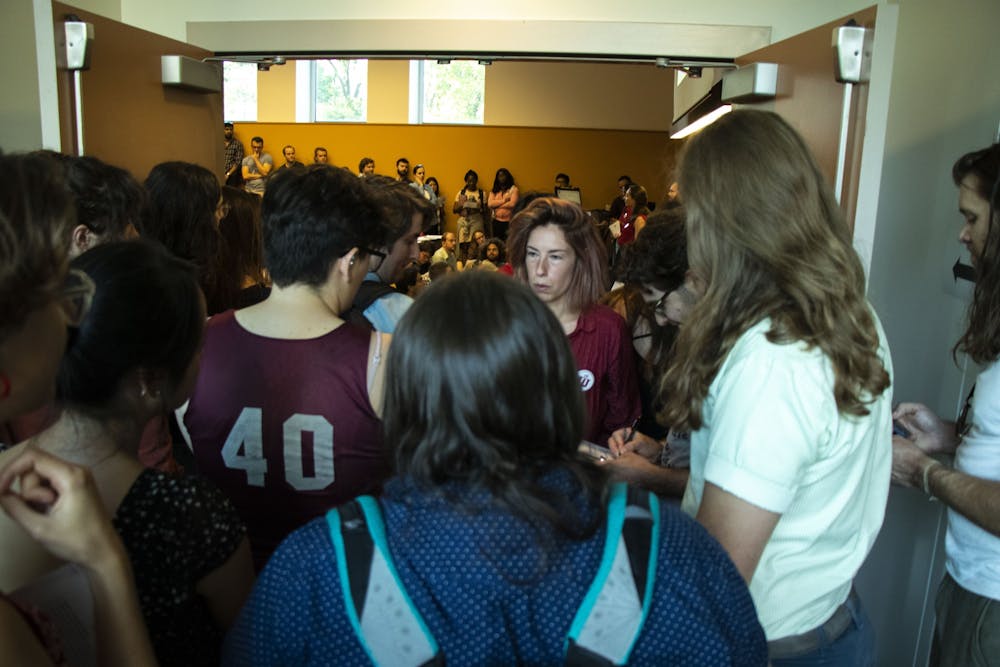"For all.”
It’s the slogan for the IU Bicentennial campaign. It’s also a promise Denisa Jashari, an IU history Ph.D. student, said she has trouble accepting.
“When the university says ‘For All,’ we want to make sure graduate students are included,” Jashari said.
Jashari is a member of Indiana Graduate Workers Coalition, a student-led organization protesting conditions for IU graduate students. The coalition’s actions so far include a town hall meeting attended by over 300 students and a petition signed by over 1,400 graduate workers at IU, or about 15% of the IU–Bloomington graduate school population.
Dan Qaurooni, a Ph.D. student and IU informatics instructor, said the Graduate Coalition first emerged from one-on-one conversations with graduate students about working conditions at IU.
“Our main goal is trying to help people with their grievances,” Qaurooni said.
Graduate students reported issues such as discrimination, faculty exploitation and lack of office space. Qaurooni said the coalition decided to target working conditions as the issue of choice, as well as mandatory and international student fees.
All students, including graduate students, pay mandatory fees to attend IU. These fees cover health, transportation, repair and rehabilitation, technology and activities at IU. International students pay additional costs.
Jashari said graduate students are familiar with the trend: Fees go up, stipends do not.
International and mandatory fees are a personal issue for Sanjana Agarwal, an international student pursuing a Ph.D. in mathematics. She said she lives with a tight budget and no savings.
“If I have a health emergency, I don’t know what I would do,” Agarwal said.
Agarwal said she loves math and wants to finish her degree, but she doesn’t know what will happen next with student fees. She said after she pays for rent and groceries, she has next to nothing.
“With fees increasing at a high percentage, it just bombards you,” Agarwal said. “I don’t know how to manage.”
Unremittable fees, or fees graduate workers pay back to the university from their pay, are another issue the coalition is working to address, Jashari said.
Jashari said many schools cover most of the costs for doctoral students to attend because they add value to the universities as faculty and researchers. She said it’s especially common for top-ranking doctoral universities, called Research 1 (R1) universities, to waive fees.
Jashari said even though IU is an R1 university, 5-10% of earnings IU graduate workers make are paid back to the university. She said it makes it hard for students to earn money from the work they do.
“At first it doesn’t seem like much, but over time, you start to notice it taking a toll on you and your life,” Jashari said.
Qaurooni said the College of Arts and Science took action following the coalition’s protest against unremittable fees earlier this semester. A week after the coalition’s first town hall, the College of Arts and Science announced it is getting rid of its unremittable fees for Fall 2020.
Jashari said even though she is happy with the progress, it's just a step for IU to get in line with what many universities are already doing.
“We’re not going to stop until we get the fees remitted for all IU graduate students," Jashari said.
The coalition’s most recent action was a protest prior to the performance of Parsifal at the IU Musical Arts Center onNov. 10. The coalition’s focus right now is on the on-going petition and a march planned in January, Jashari said.
Qaurooni said there are students who don’t sign the petition or get involved with the coalition out of fear the implications of involvement with the coalition. But there are others like himself and Jashari, he said, who believe it’s the right thing to do.
“It’s safe to say regardless of the response, we’re in it for the long haul,” Qaurooni said.




